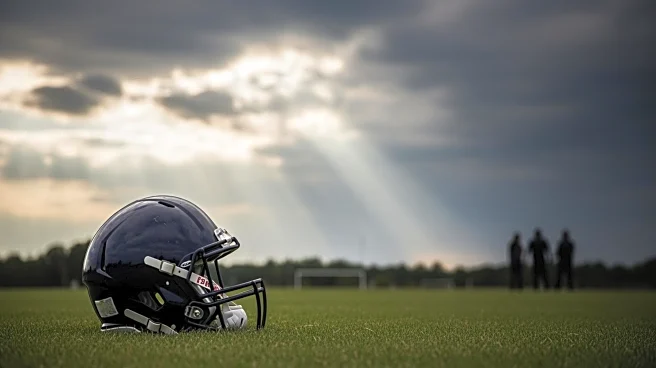What's Happening?
Marshawn Kneeland, a defensive end for the Dallas Cowboys, tragically died by suicide at the age of 24. His family expressed their devastation and grief following his death, which occurred after a police chase ended with a self-inflicted gunshot wound.
Kneeland was known for his kindness and determination both on and off the field, having recently played in a game against the Cardinals where he scored a touchdown. The news of his passing has prompted an outpouring of support from the football community and beyond, with teammates and fans expressing their sorrow and condolences.
Why It's Important?
The suicide of Marshawn Kneeland highlights the ongoing mental health challenges faced by athletes, particularly in high-pressure environments like professional sports. His death has sparked conversations about the importance of mental health support for players, who often deal with intense scrutiny and stress. The incident also underscores the need for broader societal awareness and resources to address mental health issues. The Cowboys and the NFL community are mourning the loss, which has affected teammates, fans, and the broader sports community, emphasizing the impact of mental health on public figures.
What's Next?
In the wake of Kneeland's death, the Dallas Cowboys and the NFL are likely to increase their focus on mental health initiatives and support systems for players. The team and league may implement more comprehensive mental health programs to prevent similar tragedies. Additionally, there may be calls for increased dialogue and action regarding mental health awareness in sports, potentially leading to policy changes or new support structures. The family has requested privacy as they grieve, but the broader community may continue to rally around them, offering support and solidarity.
Beyond the Headlines
Kneeland's death may lead to a deeper examination of the pressures faced by professional athletes, including the psychological toll of fame and performance expectations. This tragedy could prompt discussions about the ethical responsibilities of sports organizations to prioritize player well-being over competitive success. Long-term, it may influence cultural shifts in how mental health is perceived and addressed within the sports industry, encouraging more open conversations and proactive measures to support athletes' mental health.
















